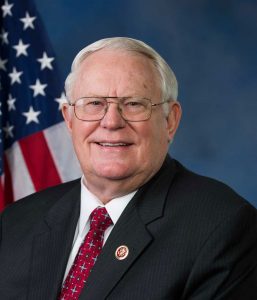By Joe Pitts, Member, U.S House of Representatives, (R-16)

U.S. Rep. Joe Pitts (R-16)
As the summer sun rises high in the sky, many of us are finishing out the season by enjoying the last remnants of our vegetables and flower blooms. Bees are ever present, seeking out nectar from their favorite flowers, and along with that comes inevitable bee stings. For some, a single sting can cause their throat to swell and heart rate to quicken. For those people, having access to an immediate dose of epinephrine, often in the form of an EpiPen, is crucial. In some cases, it is the difference between life and death.
In the 1970s, a company called Survivor Technologies invented the first automatic epinephrine injector. In 2007, Mylan acquired the right to market the device, and the price steadily rose since then. Last Thursday, Mylan announced the latest price: $600 for a two-pack of EpiPens. In 2007, the first EpiPen pack Mylan manufactured cost $100.
As Chairman of the Health Subcommittee on the Energy & Commerce Committee, I found this announcement particularly concerning. One mom wrote to me that her one-year old is allergic to tree nuts, dogs, peanuts, and eggs, and she has already had to use an EpiPen on him. Fortunately, her insurance paid $400 of the sticker price, but she still had to pay $200 out of pocket for the pair of injectors. She pleaded, “If people die due to this then there will be even bigger issues to deal with. Please help!”
Now, I don’t believe the role of government is to step in and regulate the price of EpiPens; I firmly believe in the power of the free market. The more competition we have, the better quality products we will have at better prices. The fewer barriers we have to competition, especially from the government, the better.
Unfortunately, though, EpiPens have no direct competition. It’s the main reason Mylan has been able to increase prices so drastically. The federal government must ensure it’s not getting in the way of lower cost alternatives for families who are facing potential life or death emergencies.
The Food & Drug Administration (FDA) is responsible for ensuring the efficacy and security (safety) of human drugs and medical devices, including devices like EpiPens. Any company that wishes to enter the market for an epinephrine auto-injectors must first pass through the FDA.
As Health Subcommittee Chairman, I signed onto a letter last week along with my colleagues on the Energy & Commerce Committee asking the FDA a number of questions to shed light on the situation.
We asked the Agency: (1) How many applications for generic alternatives to EpiPens have been submitted? (2) How many of these are pending? (3) How many of these applications has the FDA rejected? (5) When was each pending application submitted? (6) Has the FDA prioritized the review of these pending applications? Why or why not? (7) How would the recent policy and procedural changes FDA announced related to prioritizing certains ANDAs (Abbreviated New Drug Applications) apply in this context? (8) What are the factors that the FDA takes into consideration when approving a generic version of an EpiPen? Does the product need to use identical technology to be approved as an equivalent? (9) Has the FDA issued any guidance documents that would be of interest to a company seeking approval for a generic epinephrine auto-injector? If not, does the agency plan on issuing such guidance? If so, when?
The fact that Mylan has suddenly shifted to offer a cheaper generic version of its product in the last week does not mean we won’t encounter skyrocketing prices again. If no direct competition enters the market for EpiPens, the prices will likely creep upwards again. The FDA has a duty to ensure that our drugs are effective and safe, but if its approval process is so sluggish that it causes a monopoly on a drug that keeps consumers from accessing it, the point is moot.
The FDA must be diligent that it does not create an artificial barrier of entry for generic drugs that the American people can actually afford.






